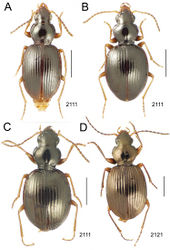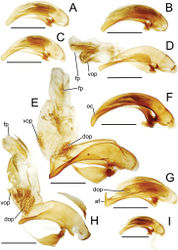Mecyclothorax paraglobosus
| Notice: | This page is derived from the original publication listed below, whose author(s) should always be credited. Further contributors may edit and improve the content of this page and, consequently, need to be credited as well (see page history). Any assessment of factual correctness requires a careful review of the original article as well as of subsequent contributions.
If you are uncertain whether your planned contribution is correct or not, we suggest that you use the associated discussion page instead of editing the page directly. This page should be cited as follows (rationale):
Citation formats to copy and paste
BibTeX: @article{Liebherr2013ZooKeys322, RIS/ Endnote: TY - JOUR Wikipedia/ Citizendium: <ref name="Liebherr2013ZooKeys322">{{Citation See also the citation download page at the journal. |
Ordo: Coleoptera
Familia: Carabidae
Genus: Mecyclothorax
Name
Mecyclothorax paraglobosus Perrault, 1989: 62 – Wikispecies link – Pensoft Profile
Identification
This species (Fig. 46C) can be diagnosed from all others except Mecyclothorax globosus by the four criteria listed under that species. From Mecyclothorax globosus (Figs 47A–C) it can be diagnosed by the male aedeagus (Fig. 47D) with the narrower, more elongate and apically expanded apex. The pronotum is more transverse than in Mecyclothorax globosus, but not diagnostically so: MPW/PL = 1.23–1.34 (n = 5). The pronotum is similarly constricted basally in both species; here MPW/BPW = 1.51–1.63. The frons and vertex are covered with an evident transverse mesh, the sculpticells more isodiametric on the neck. The pronotal disc bears a shallow transverse mesh, sculpticell breadth 2–4× length. Setal formula 2111; standardized body length 3.8–4.3 mm.
The aedeagal configuration reported here (Fig. 47D) is based on a 2006 male specimen collected at 2000 m elevation on Pito Hiti (E.M. Claridge pers. comm.). Though its aedeagal median lobe is similar to that reported by Perrault (1989[1]: fig. 12) in: 1, the breadth of the median lobe shaft subequal to that of the basal bulb; and 2, a moderately elongate apex with slightly downturned tip, the 2006 specimen differs by exhibiting a dorsoventrally narrower apex with a more spatulate tip. There are no Mecyclothorax samples between 1000 and 2000 m elevation along this ridge system – e.g., the summit Pihaaiateta – and so any possible variation associated with elevation or geographic distance remains unknown. Given our ignorance, the Pito Hiti samples are assigned to Mecyclothorax paraglobosus, recognizing that future collections from intermediate elevations will shed light on patterns of variation.
Distribution and habitat
This species is known from the Pito Hiti massif from 1000–1200 m elevation above the Supermahina housing estate. More recently it has been collected from 2000–2090 m elevation near the summit of Pito Hiti in pyrethrin fog samples of moss-covered vegetation.
Taxon Treatment
- Liebherr, J; 2013: The Mecyclothorax beetles (Coleoptera, Carabidae, Moriomorphini) of Tahiti, Society Islands ZooKeys, 322: 1-170. doi
Other References
- ↑ Perrault G (1989) La faune des Carabidae de Tahiti: IX. révision du genre Mecyclothorax (Sharp) (Psydrini) 4. le groupe de M. globosus Britton (Coleoptera). Nouvelle Revue d’Entomologie (NS) 6: 57-70.
Images
|

